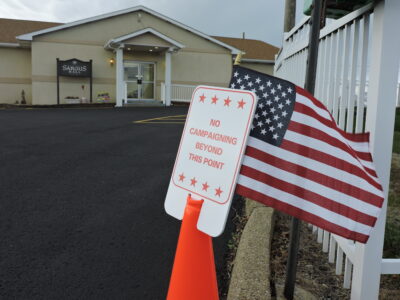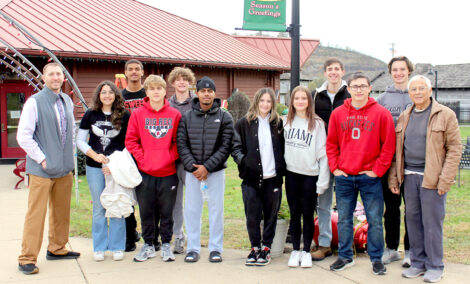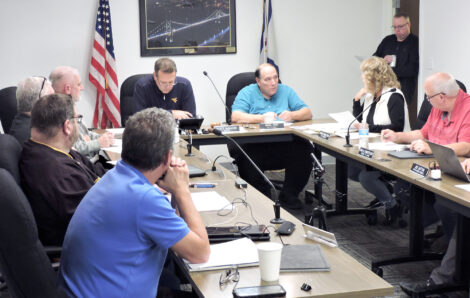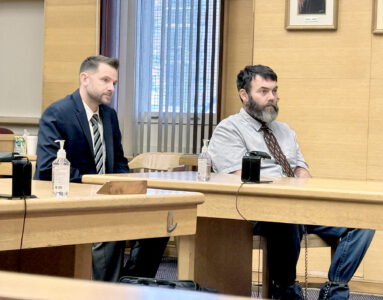OhioRISE hosts education summit on educating students with trauma
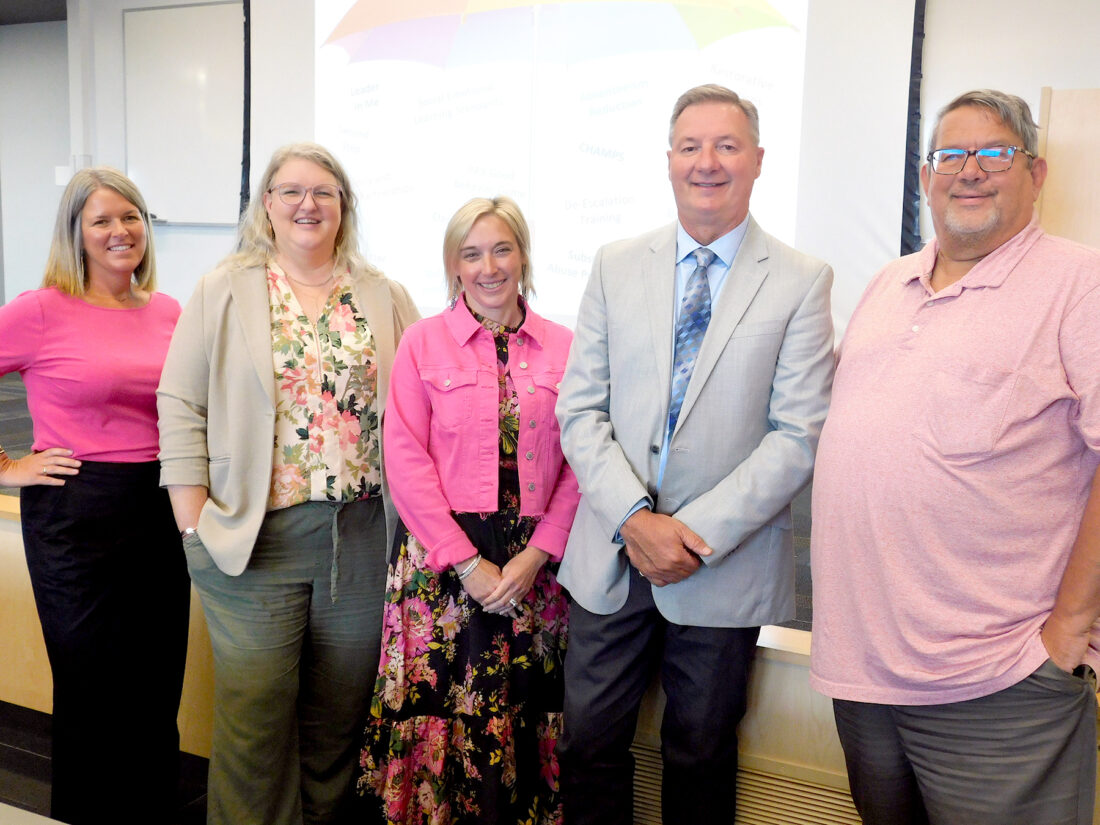
DISCUSSION — Among those making presentations at the OhioRISE summit were, from left, Vicky Filtz, OhioRISE care coordinator; Director Lindsay Brandon; Amber Fomenko, special education director of the Jefferson County Educational Service Center; Ron Sismondo, professional development director of the JCESC; and Mark Masloski, director of the Virtual Learning academy. -- Contributed
STEUBENVILLE — A cross-section of educators and service providers gathered on Aug. 5 and Aug. 7 when OhioRISE held educational summits in Stark and Harrison Counties to explore the effects of trauma on students and the tools to meet their needs.
Jefferson County Educational Service Center OhioRISE is a Medicaid managed care program for children and youth with complex behavioral health and multisystem needs in Harrison, Stark, Belmont, Carroll, Columbiana, Jefferson, Monroe and Tuscarawas Counties and operated by the educational service center.
OhioRISE was formed to coordinate resources and put families in touch with help that is available.
Lindsay Brandon, program director, said it partners with schools to match children with services.
“We’re making sure that we’re meeting the needs of the children before they become extreme needs, so that hopefully we can meet them where they are at an earlier time in their journey,” she said.
Speakers included Amber Fomenko, special education director of the service center, and Ron Sismondo, professional development director, who reviewed different challenges a student might be facing and strategies a teacher might employ to deescalate.
They said teachers often find themselves reacting to a student’s behavior, but educators can learn to recognize signs of stress, address them before an outburst and keep students learning at their best capacity.
They used the analogy of an iceberg, where the behaviors a teacher sees are only the surface. There are many underlying causes. A student may be dealing with one traumatic event, an ongoing situation or generational trauma in the household. The presentation covered how chronic trauma can impact a child’s development.
Sismondo stressed the importance of learning more about the backgrounds of the students. He and Fomenko highlighted opportunities for mentorship of students by trusted adults and creating a school-wide culture of safety and positive expectations.
Sismondo said connection makes a difference.
“If students feel that you care, or somebody cares for them, they’ll want to come to school. They’ll change their behavior because there’s somebody who cares. You’ve just got to make sure that they don’t feel that they’re a number,” Sismondo explained.
OhioRISE offers a plethora of resources when a child needs services beyond the classroom. Together with the family, they will identify the child’s areas of need and match those to supports as part of the program’s wraparound philosophy.
OhioRISE care coordinator supervisor Maryalice Surgenavic described care coordination as high-fidelity wraparound.
“Care coordinators should be meeting with families and pulling teams together,” she said. The program is voluntary and the principles of wraparound call for a community and kindred-based approach, guided by family voice and choice.
“Care coordination touches all systems,” Surgenavic said. They work with families that may be involved with children’s services and other agencies.
“We’re pulling all those people together at a table, along with our school system people and having conversations about what the family’s needs are, what their strengths are and how we’re going to get to the point where maybe some things are going a little bit better and they’re able to make their goals,” she added.
Attendees had the chance to learn about the services offered by JCESC’s other programs.
Christina Wanat, director of transitions with Eastern Ohio Aspire adult education services, said Aspire can open more opportunities for families by helping adults earn their high school equivalent diplomas.
Mark Masloski, director of JCESC’s Virtual Learning Academy, said VLA provides relevant content curriculum for teachers who may be struggling to create coursework.
“We have social and emotional learning courses,” he said. These courses cover bullying, healthy relationships and social media responsibility as well as core classes. VLA is known for its responsive staff quick to get back in touch with any user who has questions.
Masloski highlighted JCESC’s Quest Center, which offers alternative placement for students for reasons including suspension, behavioral or other needs.
Fomenko said VLA’s curriculum is used in the Ohio Cyber Academy, a statewide, tuition-free public school designed to serve students in grades 7-12 who need an alternative to traditional school.
Sismondo discussed the professional development department, which trains teachers and administrators. Their services include school collaboratives, culturally responsive practices and different types of training and career advice.
Guests included Principal Jason Conrad of the Social Training Academic Remediation Alternative School in New Philadelphia. He has had positive experiences with OhioRISE
“We do interact with them with several of our students, so it was always nice to hear from them a little bit, reaffirm their processes and services to help out kids in our community,” Conrad explained.
He was interested in the suggestions about mentorship, adding presenters introduced resources to give teaching staff perspective about the challenges students are facing.
“I appreciate the presenters who were here. They’re very knowledgeable. They’re here to help and give us ideas. I’m happy to take some of that back,” he added.
Ali Fell, a counselor from the Canton Local School District, took away valuable information about children’s brain development and how to help students regulate their emotions to better learn.
“We have had some students who have been connected to OhioRISE who have had really good family support from them and have been able to get them connected to resources to help them be successful in the classroom,” she explained.
Edison Local High School Assistant Principal Josh Leasure was interested in OhioRISE.
“It’s good for our students to have another resource in the county to reach out to if we need to meet their needs, so they can learn better here at school,” he said. “Trauma is a real thing, and you have to consider a kid’s trauma.”
Guidance Counselor Vicki Falcone of Bridgeport Exempted Village School District is no stranger to OhioRISE. The program has long partnered with her district and operates an office on campus. She agreed it is beneficial to be aware of the difficulties students may be facing.
“It’s always nice to learn about any additional resources we can use for our students, and especially OhioRISE, and how the program works and how we can better utilize that program for our families and my students.”
Cary Eckard, a counselor with Aspire Mental Health in East Liverpool said the program was important.
“The services are excellent and I can take that back to my agency,” she said. “It’s information that is definitely beneficial to know.”
To learn about OhioRISE, call (740) 792-4011; email ohiorise.info@jcesc.org; or visit OhioRISE online at jcesc.k12.oh.us/CareManagementEntity.aspx.
OhioRISE is looking for more care coordinators. Anyone interested in becoming a care coordinator can apply at jcescvla.bamboohr.com/careers/23.

